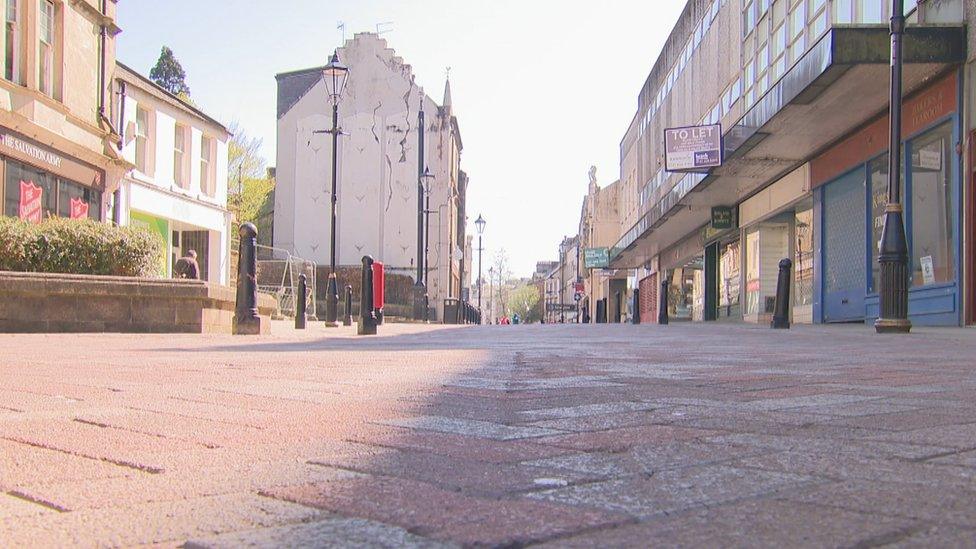Coronavirus impact: Huge rise in Scots claiming unemployment benefit
- Published
- comments

The latest figures on the labour market point to a huge increase in people claiming unemployment benefit in Scotland.
Across the UK in April, claimants went up by 856,500, the Office for National Statistics (ONS) estimates.
Its figures suggest the number of people claiming unemployment benefit in Scotland increased by 66.9% - which would be up about 75,000 to 188,000.
The April figures, which come from the UK Labour Force survey, are estimates.
The official figures only go up to the end of March, just after coronavirus lockdown began.
The ONS, external said enhancements to Universal Credit as part of the UK government's response to Covid-19 meant that an increasing number of people became eligible for unemployment-related benefit support, although still employed.
This means changes in the Claimant Count will not be due wholly to changes in the number of people who are unemployed.
In April, which was the first full month of lockdown, figures showed the number of people claiming unemployment benefit in the UK soared to 2.1 million.
They also revealed a sharp fall in hours worked and job vacancies.
The figures do not capture the impact of 7.5 million people across the UK on furlough, and millions of self-employed people whose income has been severely hit.
These estimated figures from the Office for National Statistics show that Scotland's claimant count went up by 66.9% in April with the UK Claimant Count level increasing by 69.1%.
The official Labour Market statistics only cover the three months to the end of March and do not yet reflect the "unprecedented impact" of the Covid-19 pandemic, the Scottish government said.
The latest official figures for Scotland cover January and February, when the jobs market was improving, as well as March.
The lockdown, which saw about a quarter of firms stop trading, was officially introduced on 23 March so its full impact is not seen in the statistics.

'It has come down on me like a tonne of bricks'

Musician Alan Parker, from Torrance in East Dunbartonshire, says he has never had to claim benefits before.
The 30-year-old has been making a living from the music scene since he was 17, playing keyboard and singing in small venues, but all his bookings vanished with the Covid-19 lockdown.
"Financially it has been really bad," he says. "It has come down on me like a tonne of bricks.
"This has affected me massively because I have never ever been out of work."
With no prospect of a return to work in the near future, Mr Parker says he has applied for a grant to cover self-employed people in order to help him pay the bills.

'Don't reflect full impact'
Under the latest official figures, Scotland's employment rate was slightly lower than the UK's, with 74.7% of those aged 16 to 64 (2,666,000 people) in work for the period January to March compared with 76.6%.
The unemployment rate north of the border was 4.1% (113,000 workers), which was higher than the 3.9% recorded for the UK as a whole.
At her daily briefing, First Minister Nicola Sturgeon said the official figures "do not reflect the full economic impact of the pandemic".
She said the rise in unemployment "undoubtedly further demonstrate the need to carefully get our economy moving again as quickly as we are able to do that safely".
The first minister announced the Scottish government was committing a further £33m to help people get back to work.
She said "most" of the funds would go to the Fair Start Scotland scheme, and would "have a particularly focus on helping those most adversely affected", including young people, disabled and lone parents.
Dr Stuart McIntyre, head of research at the Fraser of Allander Institute, said: "Experimental data from ONS suggest that around 75,000 more people in Scotland were claiming out of work support in April compared to March.
"In time, and as the furlough and self-employment support schemes are wound down, we will start to see some of those whose employment has been maintained through this crisis lose their jobs.
"It is important as this economic crisis unwinds that those who do lose their jobs are supported to get back into work quickly - and government will need to respond quickly in providing employment and skills support."

A SIMPLE GUIDE: How do I protect myself?
AVOIDING CONTACT: The rules on self-isolation and exercise
LOOK-UP TOOL: Check cases in your area
MAPS AND CHARTS: Visual guide to the outbreak
